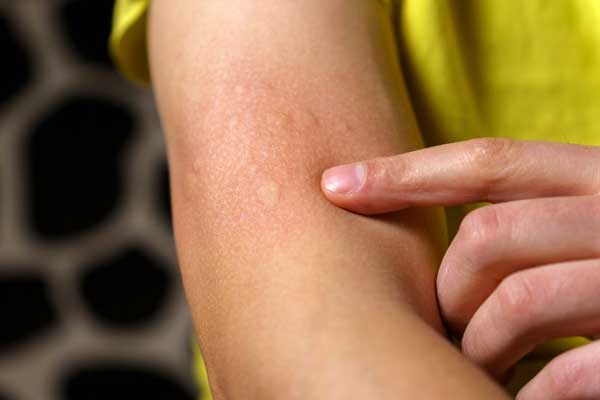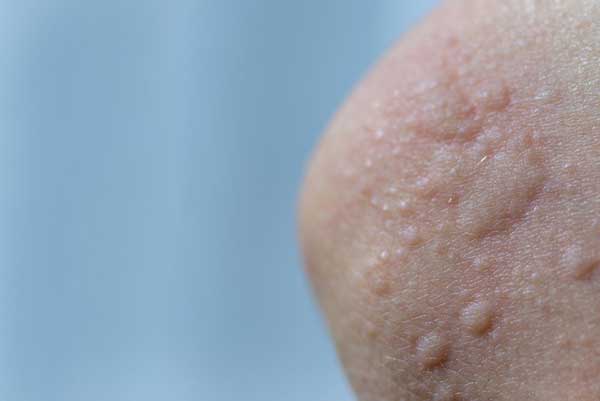Hives, also known as urticaria, are itchy, red, raised welts on the skin that appear and disappear rapidly. They are very common, affecting about 20% of people at some point. Hives can be uncomfortable and frustrating to deal with. While hives often clear up on their own, there are things you can do to relieve symptoms and speed healing.
In this article, we’ll cover 10 tips to get rid of hives faster and reduce discomfort, including identifying triggers, using medications properly, and coping emotionally with this skin condition. Whether you occasionally get a few hives or suffer from chronic hives lasting over six weeks, these practical tips can help. Let’s dive in.

What Are Hives and What Causes Them?
Hives are caused by the release of histamine in the skin, leading to swelling, redness, and itchiness. Histamine is released by mast cells in the skin in response to triggers like:
- Allergens
- Infection
- Extreme temperatures
- Stress
- Pressure on the skin
- Sun exposure
- Vibration
- Water
- Exercise
In many cases of acute and chronic hives, no cause is found. The good news is hives often go away on their own, even without an identified trigger.
Tip 1: See a Doctor for Evaluation
My number one tip is to make an appointment with a doctor if you have hives that last more than 6 weeks or are very severe. A doctor can:
- Rule out underlying conditions like thyroid disorders or autoimmune diseases
- Provide stronger medications if over-the-counter antihistamines don’t relieve symptoms
- Give guidance on managing this frustrating condition
It’s important to get an evaluation, especially if hives are interfering with sleep, work, or quality of life.
Tip 2: Keep a Symptom Diary
Keeping a diary is vital to detect patterns and potential triggers for hives. Make note of:
- When hives occur
- What you ate beforehand
- Any medications taken
- Possible environmental triggers like heat, cold, or sun exposure
- Emotional triggers like stress
Bring this diary to appointments to help your doctor determine if any lifestyle changes, dietary modifications, or medications may help.
Common Hive Triggers to Watch For:
- Food additives like dyes, preservatives, flavorings
- Alcohol
- Sun
- Pressure on the skin
- Heat or cold
- Emotional stress
- Vibration
- Medications
- Plants
Tip 3: Photograph Hives
Take clear photos of hives when they occur. Also document how long individual hives last. Photos and this timeline help doctors assess the severity of outbreaks.
Tip 4: Use Home Treatments to Relieve Itching and Discomfort
Several at-home measures can provide symptom relief:
- Cool compresses
- Anti-itch creams with pramoxine
- Avoiding tight clothing
- Moisturizers to combat dryness
- Short, lukewarm showers
- Avoiding scratching
Avoiding irritation is key. Do everything gently, including getting dressed slowly and using only gentle, fragrance-free skin care products during flare-ups.

Tip 5: Keep Calm
Try to lower stress during hive outbreaks, as stress triggers the release of adrenaline which can make hives worse. Some tips:
- Deep breathing
- Gentle yoga
- Meditation
- Calming music
- Avoiding unnecessary responsibilities
Learning to stay calm and manage stress can help reduce hive severity.
Tip 6: Don’t Obsess Over the Cause
It’s understandable to want to know why hives are occurring, but the cause is unknown in over 50% of acute and chronic hive cases. Getting overly focused on finding an answer can fuel anxiety and stress, making outbreaks worse. The good news is effective hives treatments exist even without determining the root trigger.
Tip 7: Take Medications Exactly as Prescribed
For severe or chronic hives, doctors often prescribe oral antihistamines like Zyrtec, Allegra, or Claritin. For these medications to work properly, take them exactly as prescribed each day – not just when symptoms occur. Skipping doses or taking antihistamines sporadically renders them ineffective.
If symptoms don’t improve within a few weeks despite correctly taking medications, contact your doctor. They can adjust dosages, change medications, or add additional therapies. Don’t simply stop treatment out of frustration. Having an open line of communication with your doctor is vital to tailoring an effective regimen.
Tip 8: Avoid Unnecessary Allergy Testing
Allergy tests rarely provide useful information for diagnosing and treating hives unless symptoms consistently and immediately follow exposure to a specific food or substance. Broad allergen testing usually yields positives that lead to unnecessary food restrictions without clear benefits. Save your time and money by skipping allergy tests unless explicitly recommended by your doctor.
Tip 9: Remember Hives Are Usually Temporary
It’s easy to feel hopeless and overwhelmed by recurrent hives with no identified cause. Just remember that even without a trigger, half of chronic hive cases resolve within one year. For most people, hives are a temporary frustration. Effective prescription medications can also provide relief in the interim.
Tip 10: Support Your Emotional Health
Having frequent or severe hive outbreaks understandably takes an emotional toll. Feelings of helplessness, low self-esteem due to appearance, irritability, anxiety, and depression often accompany hives. Prioritize self-care activities that support mental health like therapy, support groups, journaling, sufficient sleep, saying no to nonessential tasks, and carving out quality time doing activities you enjoy. Having an emotional outlet and proactively managing stress makes dealing with hives less burdensome.
The Takeaway
Getting hives under control takes patience, self-awareness, effective stress management, prescription medications, and open communication with medical providers. While the path to clear skin may not be straightforward, most people find their hives eventually resolve or become manageable with the right treatment plan tailored to their needs. Don’t lose hope!
Conclusion
Dealing with acute or chronic hives can negatively impact mental health and quality of life. These 10 practical tips provide tangible ways to identify triggers, find symptom relief, work with your doctor, and emotionally cope. With time and concerted effort, most people achieve remission or find an effective treatment regimen. What has your experience with hives been? Feel free to share your story and tips in the comments!
